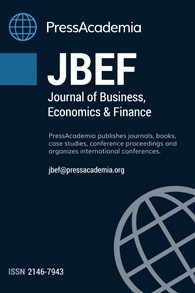THE SECTORAL EMPLOYMENT EFFECTS OF INTERNATIONAL TRADE AND PRODUCTIVITY IN THE MANUFACTURING INDUSTRY OF TURKEY
Purpose-Turkish international trade mainly consists of the sectors of manufacturing industry and also determines the dynamics in this industry. Therefore, export demand, import competition and technological changes (productivity) are very important topics for the sectors of Turkish manufacturing industry. Besides the direct employment effects of international trade, trade variables influence productivity and therefore indirectly affect employment. This study empirically analyzes the direct and indirect effects of international trade on sectoral employment in the Turkish manufacturing industry. Methodology-The data used in this study includes 22 sectors of the Turkish manufacturing industry for the period of 2009 – 2017. The panel data techniques are employed. Industry classification is NACE Rev. 2 (2-digit). Findings-The estimations show that international trade is effective on sectoral employment in the Turkish manufacturing industry. Both export demand and import penetration have a significant impact on sectoral employment in Turkey. While the increase in export demand leads to an increase in labour demand, the increase in import penetration reduces it. However, the relationship between productivity and international trade makes a negative effect on sectoral employment. The strong negative relationship between import competition and productivity, measured by value added per worker, suggests that firms, when faced with international competition, can not adjust the level of employment to decreased demand. On the other hand, the main determinant of productivity in the Turkish manufacturing industry seems to be investment expenditures. Conclusion- According to our findings, international trade is an important determinant of sectoral employment in the Turkish manufacturing industry. There is a positive relationship between export demand and employment while the relationship is negative for import competition. However, export demand is not a significant factor for productivity while import competition and productivity is negatively related. On the other hand, the main determinant of productivity in the Turkish manufacturing industry is investment expenditures. The productivity equation shows that this variable is positive and statistically significant.
Keywords:
International Trade, Export Demand, Import Competition, Productivity Employment,
___
- Abraham F., Brock, E. (2003). Sectoral employment effects of trade and productivity in Europe. Applied Economics. 35(2), 223-238. Retrieved from https://doi.org/10.1080/00036840210161828
- Ayaş, N., Çeştepe, H. (2010). Dış ticaretin istihdam üzerindeki etkileri: türk imalat sanayi örneği. Süleyman Demirel Üniversitesi İktisadi ve İdari Bilimler Fakültesi Dergisi. 15(2), 259-281. Retrieved from https://dergipark.org.tr/tr/pub/sduiibfd/issue/20827/223030
- Baltagi, B. H. (1995). Econometric Analysis of Panel Data. Chichester, John Wiley&Sons.
- Bernard, A. B., Jensen, J. B. (1999). Exceptional exporter performance: cause, effect or both? Journal of International Economics. 47 (1), 1– 25. Retrieved from https://doi.org/10.1016/S0022-1996(98)00027-0
- Bernard, A. B., Jensen, J. B. (2001). Exporting and Productivity: The Importance of Reallocation. NBER Working Paper Series, 7135, 1-31. Retrieved from http://www.nber.org/papers/w7135.pdf
- Castro, L., Olarreaga, M. And Saslavsky, D. (2007). The Impact of Trade with China and India on Argentina’s Manufacturing Employment. World Bank Policy Research Working Paper. 4153, 1-30. Retrieved from https://econpapers.repec.org/RePEc:wbk:wbrwps:4153
- Dutt, P., Mitra D., Ranjan P. (2009). International trade and unemployment: theory and cross – national evidence. Journal of International Economics. 78(1), 32–44. Retrieved from http://www.sciencedirect.com/science/article/pii/S0022-1996(09)00022-1
- Erlat, G. (2000). Measuring the ımpact of trade flows on employment ın the Turkish manufacturing ındustry. Applied Economics. 32(9), 1169- 1180. Retrieved from http://www.tandfonline.com/doi/abs/10.1080/000368400404317
- Greene, W.H. (2003). Econometric Analysis. New Jersey, Prentice Hall.
- Gül, E., Kamacı, A. (2012). Effects of ınternational trade on employment: a panel data analysis. Anadolu University Journal of Social Sciences, 12 (4), 23-32. Retrieved from https://dergipark.org.tr/tr/download/journal-file/20339
- Hadri, K. (2000). Testing for stationarity in heterogeneous panel data. Econometrics Journal, 3(2), 148–161. Retrieved from https://EconPapers.repec.org/RePEc:ect:emjrnl:v:3:y:2000:i:2:p:148-161
- Hill, R.C., Griffiths, W. H., Lim, G. C. (2011). Principles of Econometrics. Fourth Edition. John Wiley & Sons.
- Im, K.S., Pesaran, M.H., Shin, Y. (2003). Testing for unit roots in heterogeneous panels. Journal of Econometrics, 115 (1), 53–74. Retrieved from http://www.sciencedirect.com/science/article/pii/S0304-4076(03)00092-7
- Larre, B (1995). The Impact of Trade on Labour Markets: An Analysis By Industry. OECD Jobs Study Working Papers, 6, 1-35. Retrieved from https://doi.org/10.1787/247442101034
- Lawrence, R.Z. (2000). Does a kick in the pants get you going or does it just hurt? The impact of international competition on technological change in US manufacturing. (In) The Impact of International Trade on Wages. (Ed.) Feenstra, R. C. University of Chicago Press, 197–224.
- Levin, A.T., Lin, C.F., Chu, C. J. (2002). Unit root tests in panel data: Asymptotic and finite- sample properties. Journal of Econometrics, 108 (1), 1–24. Retrieved from http://www.sciencedirect.com/science/article/pii/S0304-4076(01)00098-7
- Meschi, E., Taymaz E., Vivarelli, M. (2008). Trade openness and the demand for skills: evidence from Turkish microdata. IZA Discussion Paper. 3887, 1-29. Retrieved from http://ftp.iza.org/dp3887.pdf
- Meschi, E., Taymaz, E., Vivarelli, M. (2011). Trade, techonology and skills: evidence from Turkish microdata. Labour Economics, 18 (S1), S60- S70.Retrieved from https://doi.org/10.1016/j.labeco.2011.07.001
- Neven, D., Wyplosz, C. (1996). Relative prices, trade and restructuring in European industry. CEPR Discussion Papers, 1451, 1-22. Retrieved from http://www.cepr.org/active/publications/discussion_papers/dp.php?dpno=1451
- Revenga, A., (1992). Exporting jobs? The impact of import competition on employment and wages in US manufacturing. Quarterly Journal of Economics, 107 (1), 255–84. Retrieved from https://doi.org/10.2307/2118329
- Revenga, A. (1995). Employment and Wage Effects of Trade Liberalization: The Case of Mexican Manufacturing. World Bank Policy Research Working Paper. 1524, 1-36. Retrieved from http://www-wds.worldbank.org/external/default/WDSC d/PDF/multi0page.pdf
- Tatoğlu, F.Y. (2018). Panel Veri Ekonometrisi. İstanbul, Beta yayınları.
- Tatoğlu, F.Y. (2018). İleri Panel Veri Analizi. İstanbul, Beta yayınları.
- Tatoğlu, F.Y. (2018). Panel Zaman Serileri Analizi. İstanbul, Beta yayınları.
- Turco, A. L., Daniela, M. (2013). Does trade foster employment growth in emerging markets? evidence from Turkey. World Development. 52 (C) 1-18. Retrieved from http://www.sciencedirect.com/science/article/pii/S0305750X13001496
- Turkish Statistical Institute. Statistics and Databases. www.turkstat.gov.tr
- Wooldridge J. M. (2002). Econometric Analysis of Cross Section and Panel Data. Cambridge, MIT Press.
- Yayın Aralığı: Yılda 4 Sayı
- Başlangıç: 2012
- Yayıncı: PressAcademia
